Managing family finances can be difficult even in the best of times. But should children be a part of conversations about the budget?
According to parenting advice experts, the short answer is yes.
You may have the impulse to hide family money problems from your children, either because you don’t want to scare them or you’re not sure if they’ll understand what’s happening.
After all, it’s hard enough for us to wrap our heads around exactly why the cost of living crisis is so extreme.
But experts say it’s best to be open with your children about why some things might be off the menu for now.
Teach don’t frighten
There’s a slew of environmental, economic and geopolitical factors putting pressure on people everywhere.
Businesses are facing surges in the costs of rent and energy, with many having to close down due to the pressure.
In Shetland, families could face five-digit energy bills this winter, and many families in other parts of the north are deciding whether they can afford to turn on the heat.
All of this means that families are having to rethink how they spend their money and their time.
Kirsty-Louise Hunt, senior policy and public affairs lead for Barnardo’s Scotland, spoke with the organisation’s frontline staff about family money problems.
“One of the things that does come through more often than not is that so many of the families that we support struggle with poverty or lack of income. And that really compounds problems they may be facing in their everyday life.”
The cat’s probably already out of the bag
She said if there’s any advice for parents when broaching difficult subjects like money problems, it’s not to shy away from what’s happening. Chances are, your child already senses something is different.
“In terms of how to approach a topic life this, our frontline staff say that all of the families they work with are quite honest with their kids. But in a way that’s age appropriate.
“All kids, to varying degrees depending on their age, will be aware of things going on. They’ll see things in the news or they’ll be at school and hear their classmates discussing things.
“Although they’re young and may not understand the details, they will know what’s going on. So we try to model a consistent and open approach.”
It’s an approach that Barnardo’s promotes to parents when dealing with any subjects or conversations that could trigger anxiety.
Offer alternatives instead of rejections
Luxuries like outings or special treats are some of the first things to get cut by families facing money problems.
But these are also things children look forward to, and some might be little family traditions or rewards that kids don’t want to miss out on.
Use conversations about money as learning opportunities for your children. Instead of simply saying that you can’t afford to do their favourite activity, provide them with some alternatives and ask which one they’d prefer.
This will shift the focus away from the negative – what they can’t do – and towards a more positive outlook that gives them a bit of control.
Ms Hunt said that one of the important aspects of their family services is signposting parents to events in their community that are free or inexpensive.
“I think there is societal pressure to go out for things like the cinema which can be quite expensive. But there are other things like going to the park and making use of the outdoors.”
This summer, we compiled list of free activities across the north and north-east, and many of these activities, from museums to outdoor parks, are available to parents year-round.
Preparing for the winter months
Ms Hunt said that family support staff with Barnardo’s are worried that the cost-of-living crisis could hit some families as hard as the Covid-19 pandemic this winter.
Talking to your kids about how you’re going to cope with money problems as a family could be important for curbing their anxiety.
They’re more perceptive than we give credit for and more likely than not they can sense when something has changed. Getting out in front of the conversation can keep from scaring or confusing them when you do have to make difficult decisions or changes.
More solutions to real-life parenting dilemmas
Real Life Parenting Dilemmas: Co-sleeping – cuddly or clingy?
Are our kids getting too much screen time? Experts say yes – and we could be part of the problem
How can you help your child deal with bullies at school? Kids and experts share their tips



Conversation